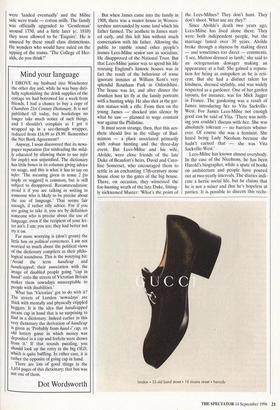Mind your language
I DROVE my husband into Winchester the other day and, while he was busy duti- fully replenishing the drink supplies of the cottage we had borrowed for a week from friends, I had a chance to buy a copy of Chambers 21st Century Dictionary. It is not published till today, but bookshops no longer take much notice of such things, and I shouldn't complain as I got it wrapped up in a see-through wrapper, reduced from £16.99 to £9.99. Remember the Net Book Agreement?
Anyway, I soon discovered that its news- paper reputation (for misleading the mild- ly educated by allowing them to use infer for imply) was unjustified. The dictionary has little boxes in its columns giving advice on usage, and this is what it has to say on infer: 'The meaning given in sense 2 [to imply or suggest] is common, but is still subject to disapproval. Recommendation: avoid it if you are talking or writing to someone who is likely to be precise about the use of language.' That seems fair enough, if rather silly advice. For if you are going to take it, you are by definition someone who is precise about the use of language, even if the recipient of your let- ter isn't. I am; you are; they had better not try it on.
Far more worrying is (don't groan) the little box on political correctness. I am not worried so much about the political views of the dictionary compilers as their philo- logical soundness. This is the worrying bit: 'Avoid the term handicap and handicapped; their association with the image of disabled people going "cap in hand" onto the streets of Victorian Britain makes them nowadays unacceptable to people with disabilities.'
What has 'Victorian' got to do with it? The streets of London 'nowadays' are thick with mentally and physically crippled beggars. It is the idea that handicapped means cap in hand that is so surprising to find in a dictionary. Indeed earlier in this very dictionary the derivation of handicap is given as 'Probably from hand cap, an old lottery game in which money was deposited in a cap and forfeits were drawn from it.' If that sounds puzzling, you should look up the entry in the big OED, which is quite baffling. In either case, it is rather the opposite of going cap in hand.
There are lots of good things in the 1,654 pages of this dictionary; that box was not one of them.
Dot Wordsworth


































































 Previous page
Previous page